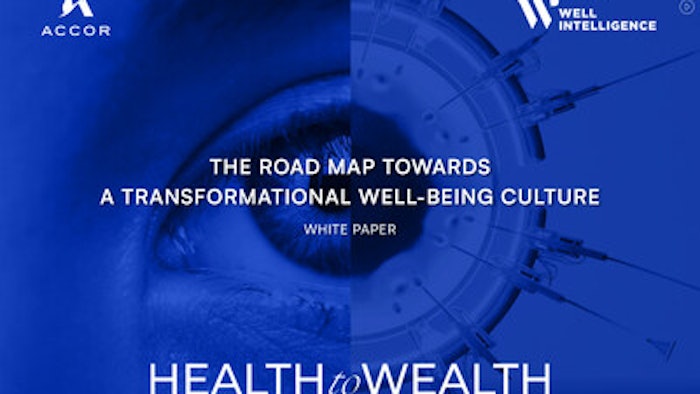
Accor announced the release of its highly anticipated research report, "The Road Map Towards a Transformational Well-Being Culture," exploring eight key pathways for navigating business, society and leadership toward a future where human well-being and fulfillment are essential priorities.
The report is a part of Accor's ongoing "Health to Wealth" series designed to explore the world's state of well-being and the defining issues of this generation. Health to Wealth previously released a 12 episode podcast featuring leading thinkers, as well as an entrepreneurial wellness start-up challenge in Paris, in collaboration with VivaTech.
The white paper highlights eight key pathways for business, governments and organizations to consider as wellness professionals plot their own roadmaps towards a culture of well-being, enabling growth in the future economy. These finding draw on insights shared by the speakers in the Health to Wealth podcast series.
Related: Study Uncovers Generational Views on Wellness Spending
Health to Wealth's 8 Key Pathways to Progress
- Well-being is body and mind: The link between mental and physical well-being has been widely documented and these learnings are yielding innovative neuroscientific technology with psychological and physiological benefits.
- Measurement can optimize well-being: Governments, health organizations, and corporations are called upon to collect more comprehensive and meaningful health data, and act on it to improve the numbers.
- Well-being starts with finances: With a longer-term goal to achieve a more equal distribution of wealth, it is essential to help people manage money and financial stress, while offering affordable well-being solutions.
- Access to well-being needs to be fully democratic: Well-being must be inclusive, available, accessible, and achievable for everyone, regardless of wealth, gender, race, nationality, sexuality or ability.
- Joined-up thinking is required: As organizations, corporations, and nations connect their ideas and actions to a wider eco-system, the improving health of their populations leads to richer, more robust economies.
- Technology must become a positive force: Empowering individuals to have control over their data, privacy, and safety, while improving the quality of data that is shared, collected, and used, is a positive force for change.
- Our own well-being is entwined with our planet: How we use the world's precious resources is critical to a sense of well-being in the world, ensuring our air, food and water supplies are safe, nourishing and sustainable.
- Well-being transcends cultural differences: The desire to be well is a universal aspiration and essential to being human; if recognized as a cornerstone of public policy, it can be the engine that transforms the world.
"Accor is seeking to drive transformational change, supporting a shift toward the emergence of a well-being economy, with an earnest desire to help people, businesses, and communities achieve their priorities for alignment and prosperity," said Emlyn Brown, Global Vice President of Well-Being for Accor. "The Health to Wealth white paper demonstrates that well-being must be recognized as an imperative for all if we are to maintain the equilibrium of our lives, our society and our planet."











